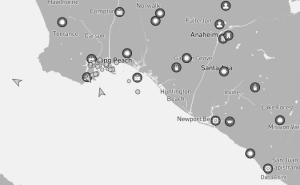You don’t need a Ph.D. in economics to see what’s happening.
Just look at the maps.
Ports that should be jammed like a rush-hour freeway — Long Beach, Los Angeles, Miami, New Orleans, Charleston — are standing there like ghost towns, cranes hanging limp, docks echoing in the wind. Out at sea? Nothing but empty horizon. No steady stream of container ships hauling in the goods that keep this country’s shelves stocked and wheels turning.
In March, Long Beach patted itself on the back for its “best month ever” — and it was, if you like sugar highs. Retailers were stampeding to get their stuff through before the president’s latest tariff temper tantrum. They knew what was coming. Now, April numbers are down nearly 12% from last year — and the real kicker? Right now, nothing is coming in. Zero. Full stop.
In the latest sign that tariff policies are rattling the real economy, figures show that the number of vessels scheduled to arrive at the Port of Los Angeles next week is down by almost a third compared to this time last year.
That’s not a hiccup. That’s a coronary.

The Ports of Long Beach and Los Angeles show a few container ships at docks, one ship entering. And that’s it. Nothing sitting in the ocean waiting to enter.
The San Pedro Bay ports of L.A. and Long Beach — which together handle almost a third of all containerized seaborne trade in the U.S. — are the main arteries feeding the American marketplace. Cars, computers, smartphones, you name it — they usually land here first. But when the arteries clog, everything from store shelves to manufacturing lines starts gasping for air.
And here’s the time bomb ticking under the hood:
It typically takes between 20 and 40 days for a container ship to make it from China to the U.S. So the ships that aren’t sailing now?
That’s going to gut trucking and rail freight around the middle of next month — just when folks are expecting summer deliveries.
No ships means no containers.
No containers mean no work for long-haul truckers and rail crews.
No UPS or Amazon deliveries.
No work means layoffs.
Layoffs mean no paychecks.
And no paychecks mean… empty shopping carts in more ways than one.
Small businesses, the so-called “backbone of America,” are getting stomped flat. A Massachusetts company has half a million dollars’ worth of games stranded overseas and just lost $16 million in orders. A pet supply outfit in Oklahoma City is watching its stock evaporate and its profits go up in smoke. But hey — at least we’re “getting tough,” right?
Meanwhile, tariffs that were supposed to be a “pressure tactic” have blown up into a 134% tax on imported goods.
That means every screw, wire, bolt, circuit, and package that used to quietly cross the Pacific just got a helluva lot more expensive — if you can even find it.
Even if someone wised up and scrapped the tariffs tomorrow, the experts say it would take months to unjam the ports, restock warehouses, and restart the economy’s engine. Months.
You can fly flags, chant slogans, and pound podiums all you want — but the economy doesn’t run on speeches. It runs on ships, trucks, and trains.
And right now, all three are running on empty.
You break it, you bought it.
And brother, it’s broken.
